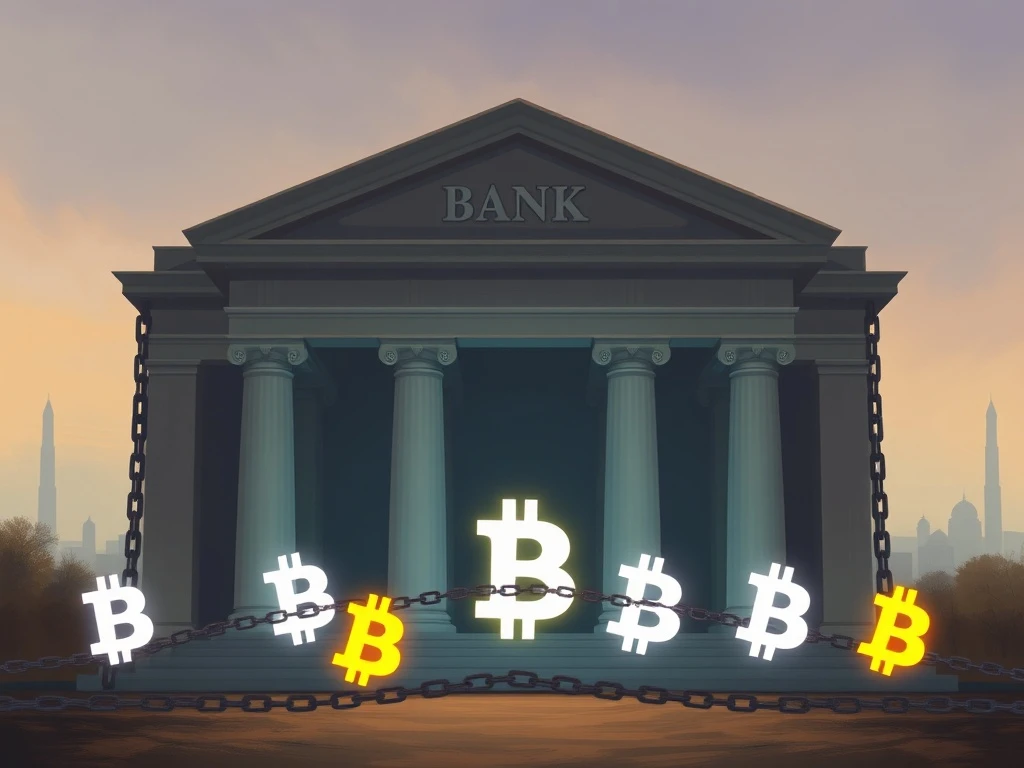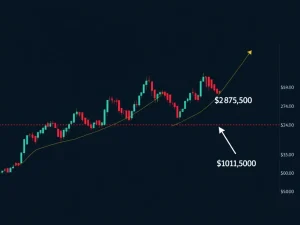Crucial: Crypto Debanking Persists as US Banks Maintain Chokepoint Policies

The cryptocurrency industry often faces significant hurdles. One persistent challenge is the ongoing issue of **crypto debanking**. Many firms struggle to access essential financial services. This situation occurs despite shifts in political sentiment. It continues to impact digital asset businesses across the United States. This article explores the continued struggles faced by crypto firms and the broader implications for the industry.
The Persistent Challenge of Crypto Debanking
Crypto firms have consistently faced account closures. They also experience denials of banking services. This practice often falls under the label of “de-risking.” Many industry participants view this as a deliberate policy. They call it “Operation Chokepoint 2.0.” This effort aims to suppress digital assets. The problem of **crypto debanking** has deep roots. It affects companies of all sizes.
After President Donald Trump’s campaign, some hoped for change. His pro-crypto stance suggested a friendlier environment. Many expected banks to ease restrictions. However, recent events suggest the practice remains entrenched. Incidents continue to surface regularly. This indicates a systemic issue rather than isolated cases.
Understanding Operation Chokepoint’s Evolution
The term “Operation Chokepoint” describes a government initiative. It pressured banks to cut ties with certain industries. These industries were deemed high-risk. The crypto community believes a similar, unofficial policy targets them. This is often referred to as “Operation Chokepoint 2.0.” It reflects concerns about money laundering and illicit finance. Yet, critics argue it suppresses legitimate businesses.
Recently, Andreessen Horowitz partner Alex Rampell issued a warning. He highlighted what he calls “Operation Chokepoint 3.0.” Rampell noted that big banks are squeezing fintech and crypto apps. They do this by hiking fees. These fees apply to accessing account data or transferring funds. This impacts platforms like Coinbase and Robinhood. Consequently, operational costs for these businesses rise significantly. This puts additional strain on their financial models.
US Banks and Unicoin’s Experience
Alex Konanykhin, CEO of Unicoin, echoed these concerns. He told Crypto News Insights that **US banks** continue closing accounts for crypto firms. They often provide no explanation. This occurs despite growing political pressure. Konanykhin stated, “We know about it first-hand, as Unicoin and its subsidiaries have been de-banked, without explanations, by several banks.” This personal experience underscores the severity of the problem.
Konanykhin listed specific institutions that cut ties with Unicoin or its subsidiaries. These include:
- Citibank
- Chase
- Wells Fargo
- City National Bank of Florida
- TD Bank
Unicoin faced debanking by four banks this year alone. Konanykhin described this as a “large-scale nationwide operation.” Unicoin is a publicly reporting corporation. It boasts six years of audited financials. It also has over 4,000 shareholders. Despite this transparency, they still encounter banking obstacles. This campaign creates “highly disruptive and damaging” conditions. It deprives crypto companies of basic financial services. This, in turn, suppresses the American crypto industry’s growth.
Donald Trump’s Intervention and Industry Hope
President **Donald Trump** has recently taken a more vocal stance. He aims to address the debanking issue. Bloomberg reported that Trump plans to sign an executive order. This order would direct federal bank regulators. They would identify and penalize financial institutions engaging in debanking. The order reportedly requires regulators to review complaint data. Furthermore, banks overseen by the Small Business Administration must work to reinstate clients. These clients were reportedly unlawfully denied services. This potential action signals a significant shift.
Konanykhin expressed hope regarding Trump’s proposed executive order. He believes it could bring much-needed relief. “The President knows the pain of de-banking first-hand,” he noted. Konanykhin added that Trump “seems determined to stop this form of economic warfare against American businesses.” Ending debanking could help the US crypto sector reclaim global leadership. He believes it could become as impactful internationally as Hollywood or Silicon Valley. This demonstrates strong industry optimism tied to political action.
Navigating Future Crypto Regulation
Meaningful change hinges on the final wording of new rules. Elizabeth Blickley, a partner at Fox Rothschild’s Tax Controversy & Litigation Practice, weighed in. She noted that Trump has directed agencies and Congress to review crypto integration. However, the specifics of **crypto regulation** remain crucial. For instance, the recently signed Genius Act provides a framework. It gives the Federal Reserve’s Stablecoin Certification Review Committee 180 days. They must design a regulatory framework. This timeline offers a window for significant policy development.
Blickley also warned about the legislative process. Most bills in Congress never pass committee. Any eventual legislation will likely face litigation. Both sides of the regulatory debate will challenge it. “A regulation may facially comply with the President’s request or a law passed, yet have little application or disproportionate impacts based solely on word-choice,” she explained. Therefore, the details truly matter. For now, banks will likely maintain a risk-averse stance. This will continue until new rules clearly reduce perceived risks. Blickley concluded, “It’s all about making risk-averse entities and people feel like crypto is less of a risk.” Clear, unambiguous guidelines are essential for progress in the industry.









